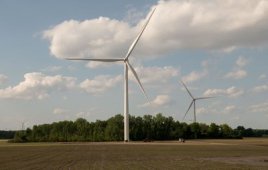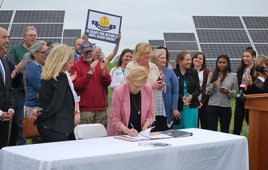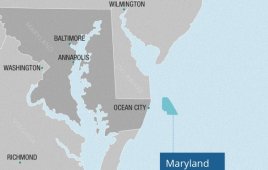This article comes from law firm Hunton & Williams LLP and is authored by Timothy L. Jacobs, Laura Ellen Jones
and Hilary B. Lefko
On October 24, 2016, in Alta Wind I Owner-Lessor C et al. v. United States, Nos. 13-402T et al., the U.S. Court of Federal Claims (“the Court”) ruled in favor of the owners of six wind farm facilities who had applied for grant funds under Section 1603 of the American Recovery and Reinvestment Act (“the 1603 Grant”). This case is an important development in the renewable energy area as the Court rejected all of the government’s arguments for reducing the 1603 Grant. Treasury routinely made these same arguments to reduce the 1603 Grants claimed by numerous parties in renewable energy projects that qualified for the 1603 Grant program.
The wind farm owners had sought more than $206 million in the litigation, which they alleged the Treasury Department had underpaid, and the Court’s decision awarded the entire underpaid amount to the plaintiffs. The Alta Wind case involved 20 plaintiffs and eight complaints, each of which involved the sale and leaseback of wind energy facilities. The developer was both the seller and the lessee in the sale-leaseback transactions.
The Alta Wind case is one of numerous cases in which Treasury reduced grant awards to applicants on the basis that the purchase price paid for renewable energy facilities involved “peculiar circumstances” and required allocation of cost basis to nonqualified intangible assets. As the Court summarized, “[t] he government maintains that basis really should be calculated from the value of each wind farm’s grant- eligible constituent parts and their respective development and construction costs, citing a myriad of factors that allegedly made the purchase prices an unfair measure of each wind farm’s value.” The Government also argued in Alta Wind that “the residual method of accounting” under Internal Revenue Code (IRC) Section 1060 was applicable. The Court rejected those lines of attack by Treasury and upheld the cost basis reported by the wind farm owners as evidenced by the purchase price they paid.
A copy of the Alta Wind opinion is available here. The Court had previously granted the government’s motion for full discovery and stayed the wind farm owners’ summary judgment motions. For a full copy of a client alert, click here or for a prior alert, click here. The Alta Wind case is one of a number of Section 1603 Grant cases being litigated in the Court of Federal Claims.
Filed Under: Uncategorized





